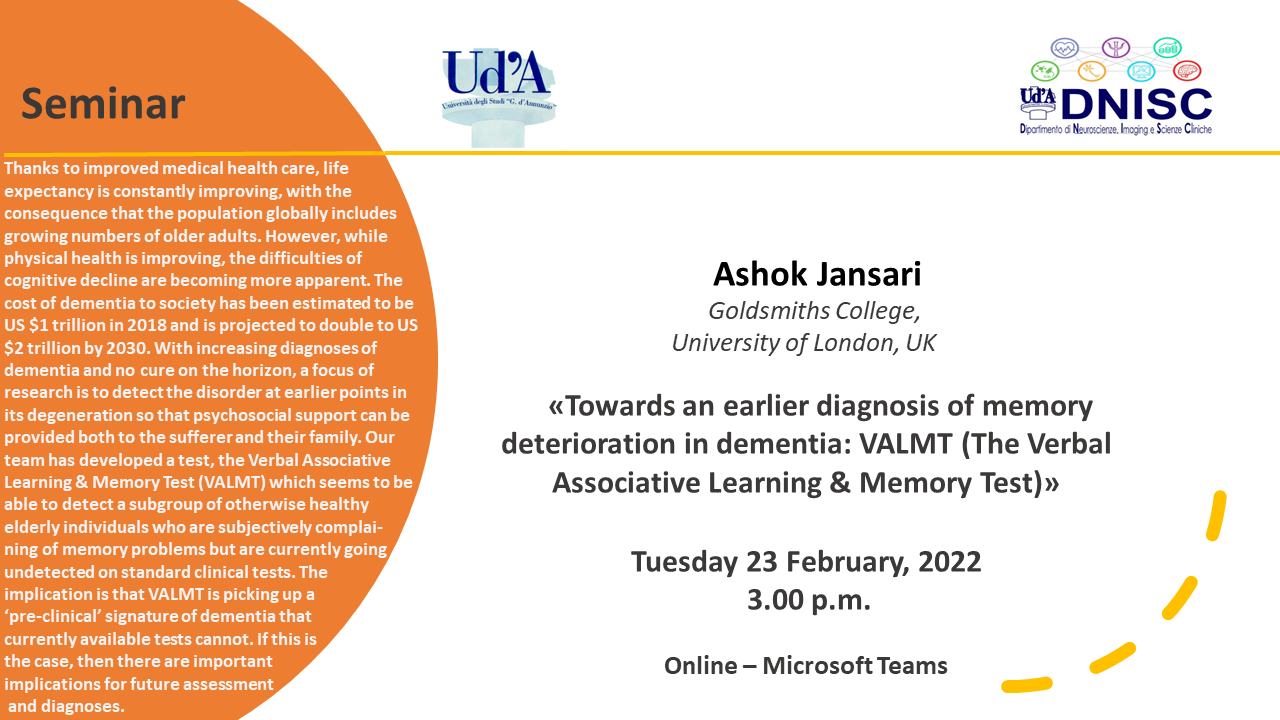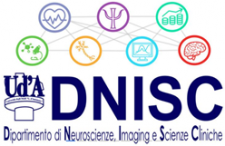VALMT (The Verbal Associative Learning & Memory Test)


SEMINARIO / SEMINAR
Titolo / Title:
Towards an earlier diagnosis of memory deterioration in dementia: VALMT (The Verbal Associative Learning & Memory Test)
Quando / When:
23 Febbraio 2022, ore 15:00 / 23rd of February 2022 at 15:00 CET
Dove / Where:
Online (Microsoft Teams)
Relatore / Speaker:
Dr Ashok Jansari, Goldsmiths College, University of London, UK
Abstract: Thanks to improved medical health care, life expectancy is constantly improving, with the consequence that the population globally includes growing numbers of older adults. The World Health Organisation (WHO) suggests that globally between 2015 and 2050, the proportion of the world's population over 60 years is predicted to nearly double from 12% to 22%. Worryingly, by 2050, 80% of older people will be living in low- and middle-income countries.
However, while physical health is improving, the difficulties of cognitive decline are becoming more apparent. The cost of dementia to society has been estimated to be US $1 trillion in 2018 and is projected to double to US $2 trillion by 2030. With increasing diagnoses of dementia and no cure on the horizon, a focus of research is to detect the disorder at earlier points in its degeneration so that psychosocial support can be provided both to the sufferer and their family. In a series of studies, our team has developed a test, the Verbal Associative Learning & Memory Test (VALMT) which seems to be able to detect a subgroup of otherwise healthy elderly individuals who are subjectively complaining of memory problems but who are currently going undetected on standard clinical tests. The implication is that VALMT is picking up a ‘pre-clinical’ signature of dementia that currently available tests cannot. If this is the case, then there are important implications for future assessment and diagnoses. In related work, we have started to use VALMT to look at the effects of Chronic Traumatic Encephalopathy (CTE) through contact sports; through CTE, many people who have engaged in contact sports for many years are being diagnosed with dementia very early, in their 40s. Finally, exciting new work is going to explore whether VALMT can detect the subtle changes in memory that can occur during the peri-menopause, menopause and then during Hormone Replacement Therapy in women.
The Speaker
Dr Jansari is a cognitive neuropsychologist with over 30 years of experience in the field having trained at King’s College Cambridge, Sussex University and the University of Iowa Hospitals & Clinics. In his research he studies everyday mental functions such as memory and face-recognition by studying individuals who have profound difficulties in these abilities that we take for granted resulting in a variety of disorders such as amnesia, dementia or prosopagnosia (inability to recognise familiar faces). In addition to his research expertise, Dr Jansari has also developed an expertise in being able to 'translate' general issues in psychology and science to the lay-person to make them more accessible having appeared on TV in the UK, Germany, Norway and Japan. For this work, he has been nominated for a British Academy Charles Darwin Award for communicating science to non-specialist audiences.